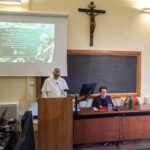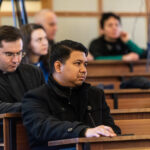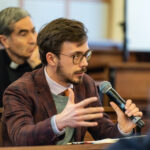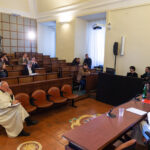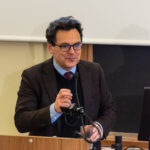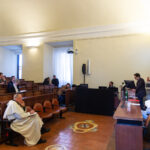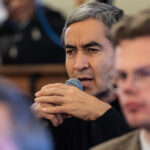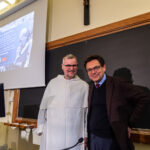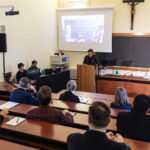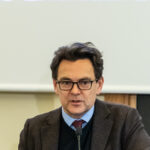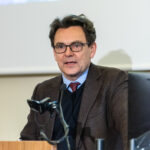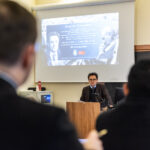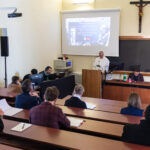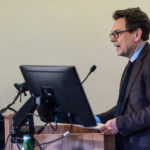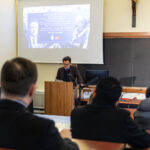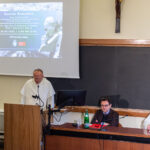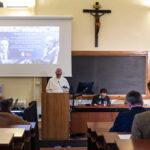
- This event has passed.
JP2 Lectures // Dariusz Karłowicz: Reset or Revolution? Contemporary Problems of Political Stability and Some Ancient Solutions
March 1, 2023 @ 3:00 pm - 4:30 pm

On March 1, another JP2 Lecture in the 2022/23 academic year was held at the St. John Paul II Institute of Culture. The lecture, entitled “Reset or Revolution? Contemporary Problems of Political Stability and Some Ancient Solutions” was delivered by Dr. Dariusz Karlowicz, Program Director of the St. John Paul II Institute of Culture and President of the St. Nicholas Foundation. Fr. Cezary Binkiewicz OP, director of the St. John Paul II Institute of Culture in Rome at the Angelicum, introduced the audience gathered in the hall and in front of the computer screens to the topic.
In his talk, Dr. Dariusz Karłowicz addressed the issue of political and legal stability in the context of a kind of degeneration of the political system and the crisis affecting Western societies. He analyzed the negative side effects of stability, commonly understood as an unequivocally positive goal state, an absolute good. First, the speaker outlined the historical background of the situation in which we currently find ourselves. Stability understood as a problem is a relatively new phenomenon. In the turbulent history of Europe, it has so far been presented as a noble aspiration, guided by the words of Cicero: “Remember that the establishment of a state that is stable enough to last for centuries requires by far the highest intellectual forces that nature can produce.” Nowadays, said Karłowicz, “we live in a reality that everyone has aspired to, but that no one has ever experienced. (…) We are beginning to realize that progress is not the only variable of political order.”
Karłowicz cited statistics according to which many citizens of European countries believe that the post-war status quo needs to be changed, and the only way to do this is through a kind of revolution or reset – “one in five Germans and four out of ten French are in favor of forcibly tearing down the existing order.”
According to the speaker, one of the key moments leading us to this state of affairs was the economic crisis of 2007 and 2008, which shook the foundations of the liberal, or rather neoliberal, West. The axiom of endless progress, the dogma of steady growth, collapsed. In the end, it turned out that the poorest suffered the greatest costs. – “In the name of stability, the world bailed out and protected the richest, as well as the institutions that were otherwise responsible for the follies of the high-risk mortgage market,” he concluded.
The rest of the lecture focused on the relationship between stability and democracy. A period of peace, so to speak, puts our vigilance to sleep – instead, the conflict between the status quo secured by law and politics – and intuition based on the principle of equality and freedom – grows. Karłowicz compared the situation thus created to the tension between justice and freedom distinguished by Plato, typical of democracy. According to his teaching, the right kind of balance between justice – the aristocratic element – and the more popular element of freedom – protects democracy from anarchy. Karłowicz noted that today the system in democratic states is beginning to preserve the mechanisms of inheritance of differences and divisions, which in practice means the perversion of egalitarianism and the emergence of an increasingly undemocratic rule of law. Under such conditions, equality and freedom become empty slogans. He also pointed to polls that indicate growing disillusionment with the state of democracy. According to the Pew Research Center, the vast majority of residents of major European countries express dissatisfaction with the way democracy works in their countries: (43% of Germans, 55% of Britons, 51% of French, 70% of Italians, 81% of Spaniards). According to Karłowicz, the problem we face is essentially political – “It’s about regaining control over the formal and, above all, informal centers of power that function outside the control of democratic mechanisms, outside the control of the state and international organizations,” – he said. As he went on to say, in order to achieve a peaceful, non-revolutionary reset, existing rules must be redefined, and this in turn requires a broad political consensus. It would also require self-restraint from the beneficiaries of the current system. – “Among the elites, however, there is no sign of such a willingness to self-restraint,” he said. – he concluded. Later in the speech, Karłowicz presented several ancient solutions that could serve as inspiration for breaking the toxic stability that sustains various social pathologies. The first of these was the institution of debt cancellation present in Mesopotamia, Egypt and Greece. Cancellation was a guarantee of the stability of the existing political, social and economic order. Cancellation, combined with release from debt bondage and the obligation to pay compensation or return property seized for debts by lenders, was supposed to guarantee peace and stability and restore the status quo ante, which had been destroyed by economic chaos. As Karłowicz pointed out, “the key to understanding this practice is the fact that the stability of the state and its political, as well as social model, was considered the highest good, far above the rules of everyday community life. The imprudent transformation of stability mechanisms into an absolute could destroy the political order. Discontinuity thus becomes a condition of continuity.” Another example was taken by the speaker from ancient Greece. Many of the solutions used there can be considered a model reset. As a leading example, Karłowicz presented Solon’s famous reforms, characterizing two of them in more detail: the first was the institution of trial by jury, and the second was the strict pairing of citizens’ political privileges and duties with one of the four income groups. Trial by jury limited the judicial monopoly of the aristocracy and strengthened the political agency of the people. The equalization of political duties with income groups removed the poorest citizens from office and reserved the highest offices for the wealthiest. At the same time, the principle of aristocratic rule by birth as the decisive qualification for oligarchy was replaced once and for all by the principle of wealth. In conclusion, Karłowicz listed the reasons why he thought these reforms could be considered a model of reset: “First, they were preceded by the mutual consent of the parties, which created a ‘constitutional moment’ ensuring the legitimacy of fundamental changes within the polis. Second, by modifying the systemic monopoly of the eupatrids, the reforms went far beyond the economic and social sphere, as they took into account the political aspirations of the people. Third, the reforms were the minimum required correction: they met the expectations of the “sixth partisans” while not throwing the eupatrids to the side of the losers. Solon’s reset preserves political continuity. Unlike a reset caused by war or revolution, it was a compromise by which a legal change was made in the name of peace and the balance of justice – which both sides considered a common good.” Another example of a model reset is taken from the Old Testament. It is the “Sabbatical year”. As the speaker pointed out, it brings an annulment of unwanted but lawful changes, a shaking off of debts, redemption from debt bondage, and the release of land taken for debt. Interestingly, it includes a system that calculates prices in proportion to the time left until the Sabbatical year (Leviticus 25; Deuteronomy 15:1-18; Exodus 21:1-11; 23:10-13). Analyzing this concept, Karłowicz noted that the idea of a sabbatical year clearly suggests that stability does not protect against evil and decay, as well as against randomness and uncertainty – stability is in no way eschatological, it does not mean the end of history. In the final part of the lecture, the speaker observed the tendency of secular political systems to absolutize their own rules and procedures. – “Without references to God, any relativization of the rules that reproduce political order and stability – for example, the invalidation of creditor’s rights – poses a threat to the entire system,” he – He added. In conclusion, Karłowicz pointed out the harmful absolutization of the idea of stability that we are currently facing and the negative consequences resulting from it. He also postulated the need for fundamental reforms along the lines of Solon’s reset. Fot. Stefano Dal Pozzolo


